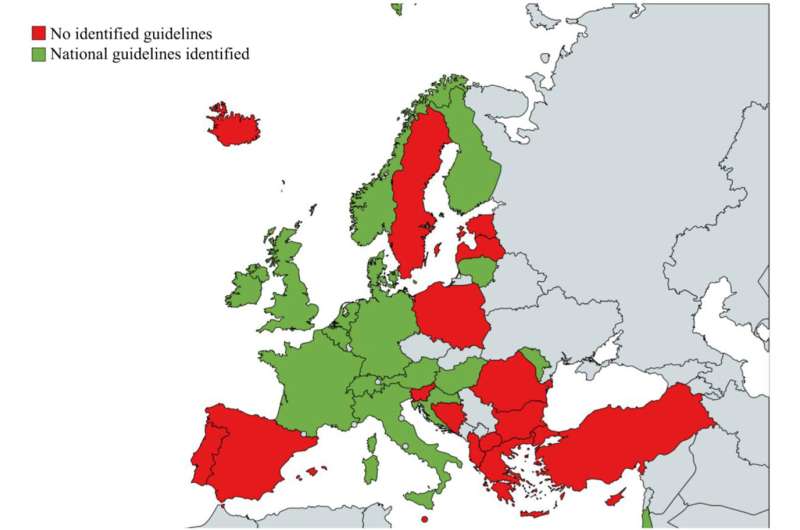This article has been reviewed according to Science X's editorial process and policies. Editors have highlighted the following attributes while ensuring the content's credibility:
fact-checked
trusted source
proofread
Europe urgently needs guidelines for the care of child victims of sexual abuse, finds review

Only half of 34 surveyed European countries have national guidelines on how to provide clinical care and treatment to children who have experienced sexual abuse. This finding was revealed in a study led by researchers at Barnafrid, a national knowledge center in the field of violence and other abuse against children, at Linköping University in Sweden.
The consequences for the affected children can be severe, according to the researchers. The work is published in The Lancet Regional Health—Europe.
"Our findings suggest that children in Europe may not receive equal care. From a child rights perspective, this is unacceptable. We know that sexual abuse increases the risk of poorer physical and mental health in childhood, and later in life," says Dr. Gabriel Otterman, a senior consultant pediatrician in Uppsala and adjunct associate professor at Barnafrid, Linköping University.
National clinical practice guidelines encompass numerous medical fields. This ensures that the care provided is scientifically verified and that everyone is treated equally.
But many countries lack guidelines for the care of children who have been subjected to sexual abuse. For the survey of 34 European countries conducted by Otterman in collaboration with a network of international researchers, their search for national documents led them to explore international scientific databases, the websites of health authorities and engage with experts from across the European Region.
Only half of the countries were found to have something resembling national guidelines in this area. In Sweden, Poland, Spain, and Turkey, for example, such guidelines were not identified. However, the existing guidelines are also severely lacking in quality.
To measure quality, the researchers used guidelines for the clinical management of child sexual abuse issued by the WHO as a benchmark. Otterman refers to these scientifically robust guidelines as the "gold standard." Upon comparison, it turns out that the various national guidelines are often outdated and fail to incorporate the latest scientific insights.
The researchers identified significant gaps primarily in the domains of risk assessment, mental health care and opportunities for children to be heard. Overall, they found many aspects in need of improvement. Among the guidelines reviewed, Moldova's national guidelines received the highest quality rating, while one of the documents from the U.K. was deemed the least adequate.
To address these shortcomings, the researchers recommend that countries convene an international panel of clinicians and researchers, which should also include people who themselves have experienced sexual abuse in childhood.
Together, they would develop, oversee, and periodically update common European guidelines. This collaborative approach could offer guidelines that are better suited to European contexts than those from the WHO. The countries could then make their own adjustments as needed and be responsible for follow-up. Nations can then tailor these to their specific needs and ensure diligent implementation and monitoring.
With his considerable experience in providing care for children who have suffered sexual abuse, Gabriel Otterman underscores the critical need of establishing shared guidelines.
"I see this need every day. If you have national evidence-based guidelines, then you have something to live up to and you can compare regions and countries," says Otterman.
More information: Gabriel Otterman et al, Clinical care of childhood sexual abuse: a systematic review and critical appraisal of guidelines from European countries, The Lancet Regional Health—Europe (2024). DOI: 10.1016/j.lanepe.2024.100868





















